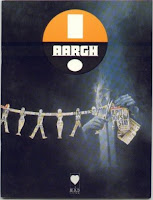AARGH (Artists Against Rampant Government Homophobia)
 AARGH (Artists Against Rampant Government Homophobia) was a one-off comic book anthology published by Mad Love in 1988. The comic was designed to aid the fight against Clause 28, which was a controversial amendment to British local authorities which was designed to outlaw the promotion of homosexuality.
AARGH (Artists Against Rampant Government Homophobia) was a one-off comic book anthology published by Mad Love in 1988. The comic was designed to aid the fight against Clause 28, which was a controversial amendment to British local authorities which was designed to outlaw the promotion of homosexuality.
At that time Alan Moore, who was in a relationship with his wife and their girlfriend, felt that the law was wrong and homophobic and that it would obviously affect them personally. To help their fight Moore formed Mad Love, his own publishing company, to release AARGH.
The title was a mixed bag of stories and art by Neil Gaiman, Bryan Talbot, Dave Sim and Dave Gibbons. Moore contributed an eight page story called The Mirror of Love, with Steve Bissette and Rick Veitch providing art. The comic was praised for some of its content and sold well.
Clause 28 was eventually repealed in 2003. Moore has also reworked The Mirror of Love with illustrator José Villarrubia for Top Shelf Productions.
THE ALAN MOORE INTERVIEW
In Brought to Light, just on your little biography there it says you did something called AARGH, Artists Against Rampant Government Homophobia.
Yeah this was - what year was this? About '88? The Clause 28.
Oh, I remember that.
Well, you would remember it then, I don't think they have got rid of it still, have they? I mean, they're still having these fucking huge debates. I thought it had just dropped out of existence completely but then I see that they're having these huge debates up in Scotland because everyone's upset because the government want to get rid of Clause 28 and they see Clause 28 as being the only fragile bulwark between their precious children and this army of homosexuals who out to corrupt them, you know? Yeah but when Thatcher brought that in, in '88, at the time I was part of - there was kind of - there was me, there was my wife and there was our girlfriend and we were all kind of living together quite openly as a different sort of relationship. It lasted for two or three years. At that time obviously we were a lot closer to the lesbian and gay scene and when we saw this legislation coming down we thought it was pretty alarming because there actually hadn't been any legislation that had specifically legislated against one particular sub-group before. This was Nazi legislation, especially when you'd got enthusiastic Conservative councillors talking about "gassing the queers" being the only ultimate solution to the problem, then it was a bit nerve-wracking. So what we decided to do was mobilize as many famous friends as I could dig up and put out a benefit book with all the money going to the organization for lesbian and gay action.
So it wasn't an organization in itself?
It wasn't an organization in itself, no, it was just a magazine. The response was great. We had Frank Miller, Robert Crumb, Dave Gibbons, Art Spiegelman, Howard Cruse, Brian Bolland, Hunt Emerson, just everybody, Neil Gaiman, everybody chipped in and I think we made somewhere like pushing twenty grand for the organization of lesbian and gay action, who actually, we didn't even like that much, because they were sort of -
Were they militant themselves?
Ah, they were militant, bigoted, half-arsed. When we actually met them they didn't even like the fact that - I mean it was Phyllis and Debbie who went to deal with them - the fact that Phyllis and Debbie said that they were bisexual. This, you know, "Huh! Accepting money from bisexuals!" I think one of them said "We'll be allowing men in next!" However, once we raised the seventeen, twenty thousand, whatever it was, they were very different.
They loved you then?
Oh, they loved us then. But we kept up a kind of frosty contempt. We said "Here's your seventeen thousand but please understand that the way that you've treated us throughout all this says an awful lot about problems that you ought to look at within your own structure." [Laughs] Yeah. You know. It was a worthwhile thing. I've still got some copies of AARGH floating around upstairs somewhere. It was a nice Dave McKean cover.
Oh, cool.
It was a cool little magazine.
Finally download it now From Here
